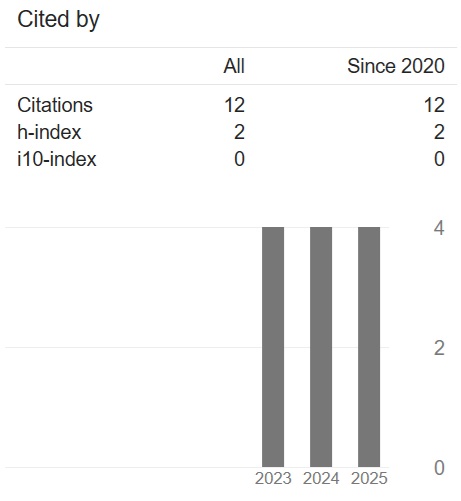Keterkaitan Sifat Sabar dan Optimisme dalam Hadis Nabi: Tinjauan Tekstual dan Kontekstual serta Relevansinya dengan Terapi Self Talk Positif
The Relationship Between Patience and Optimism in the Prophet's Hadith: A Textual and Contextual Review and Its Relevance to Positive Self-Talk Therapy
DOI:
https://doi.org/10.36701/jawamiulkalim.v2i2.1743Keywords:
Patience, Optimism, If Only, Disasters, Self-Talk PositiveAbstract
This research aims to determine the relationship between patience and optimism based on the perspective of the hadith of the Prophet Muhammad. This research is descriptive research using library methods and a ma'ani hadith study approach. The results of this research found several things. First, the Hadith of Abu Hurairah which is the basis of this research is considered valid in terms of sanad and matan. Second, textually, Abu Hurairah's hadith emphasizes the importance of faith, physical strength and enthusiasm in worship and encourages people to be serious in their efforts while asking for Allah's help, and to be patient when facing disaster without saying "if only". Third, contextually this hadith emphasizes the importance of being patient with disasters without saying "if only" because this is contrary to the patient attitude commanded by Allah in the Qur'an so that the value of patience must be reflected in actions and words, as well as avoiding behavior or words that criticize the decrees. God. Fourth, the relevance of this hadith is very strong in everyday life where humans are commanded to try to obtain goodness through hard work, asking Allah for help, and avoiding laziness and weakness. When facing adversity, this hadith teaches the importance of being patient, being kind, and avoiding attitudes that show rejection of Allah's decrees. This research is also in line with modern psychology approaches through positive self-talk therapy, to build an attitude of optimism and a positive mindset in facing life's challenges.
References
Buku:
Abu ‘A>shim, Abu> Bakr. al-Sunnah. Cet. I; Beirut: al-Maktab al-Islami, 1400.
Abu Ha>tim, ‘Abdul Rahman bin Muhammad. Al-Jarh wa al-Ta’dil. Cet. I; Beirut: Dar Ihya al-Turats, 1952.
Ahmad, Arifuddin. Metodologi Pemahaman Hadis. Cet. XI; Makassar: Alauddin University Press, 2013.
Al-‘Asqala>ni, Ah{mad bin ‘Ali bin H{ajr. Tahzib al-Tahzib. Cet. I; India: Matba’ah Dairah al-Ma’arif, 1326.
Al-‘Asqala>ni, Ah{mad bin ‘Ali bin H{ajr. Taqrib al-Tahzib. Cet. I; Suriah: Dar al-Rasyid, 1986.
Al-Asy’as, Abu> Da>wud Sulaima>n. Sunan Abu Da>wud. Cet. I; Beirut: Dar al-Risalah al-‘Ilmiyyah, 2009.
Al-Baihaqi, Ah{mad bin al-H{usain. al-Sunan al-Kubra. Cet. III; Beirut: Dar al-Kutub al-‘Ilmiyyah, 2003.
Al-Bazzar, Ah{mad bin ‘Amru. Musnad al-Bazza>r. Cet. I; al-Madinah al-Munawwarah, 2009.
Al-Bukha>ri, Muh{ammad bin Isma>’il. Sahi>h al-Bukha>ri. Cet. I; Dar Tauq al-Najat, 1422.
Al-Dzahabi, Muhammad bin Ahmad bin ‘Utsman. Siyar A’lam al-Nubala. Cet. III; Beirut: Muassasah Al-Risalah, 1405 H.
Al-Hajja>j, Muslim. Sahi>h Muslim. Beirut: Dar Ihya Turas al-‘Arabi.
Ibn Hajr, Ah{mad bin ‘Ali. Fath al-Ba>ri. Beirut: Dar al-Ma’rifah, 1379.
Ibn H{anbal, Ah{mad bin Muh{ammad. Musnad Ah{mad. Cet. I; Beirut: Muassasah al-Risalah, 2001.
Ibn H{ibba>n, Muh{ammad. Sah{i>h Ibn H{ibban. Cet. I; Beirut: Muassasah al-Risalah, 1988.
Ibn H{ibba>n, Muhammad. al-Siqat. Cet. I; India: Dairah al-Ma’arif, 1973.
Ibn Manzu>r, Muh{ammad bin Mukrim bin ‘Ali. Lisa>n al-‘Arab. Cet. III; Beirut: Dar Sadir, 1414.
Ibn Sa’ad, Muh{ammad. al-Tabaqat al-Kubra. Cet. I; Beirut: Dar al-Kutub al-‘Ilmiyyah, 1990.
Ibn Sa’ad, Muh{ammad. al-Tabaqat al-Kubra. Cet. II; Madinah Munawwarah: Maktabah al-‘Ulum wa al-Hikam, 1408.
Ibn Sunni, Ah{mad bin Muh{ammad.‘Amal al-Yaum wa al-Lailah. Jeddah: Dar al-Qiblat.
Ibn Taimiyyah, Ah{mad bin ‘Abdul Halim. al-Ihtijaj bi al-Qadr. Cet. IV; Beirut: al-Maktab al-Islami, 1404.
Al-‘Ijliy, Ah{mad bin ‘Abdullah. Ma’rifah al-Tsiqat. Cet. I; Madinah Munawwarah: Maktabah al-Dar, 1985.
Al-Jauhari, Isma>’il bin H{amma>d. al-Siha>h Ta>j al-Lugah wa Siha>h al-‘Arabiyah. Cet. IV; Beirut: Dar al-‘Ilm, 1987.
Al-Jauziyyah, Muh{ammad bin Abu> Bakr bin Qayyim. Risa>lah Ibn Qayyim Ila> Ahadi Ikhwa>nihi. Cet. I; Riyad: Matabi’ al-Syarq al-Awsat, 1420.
Al-Jurja>ni, ‘Ali bin Muh{ammad. al-Ta’rifa>t. Cet. I; Beirut: Dar al-Kutub al-‘Ilmiyyah, 1983.
Al-Mausili, Abu Ya’la Ah{mad bin ‘Ali. Musnad Abu> Ya’la. Cet. I; Damaskus: Dar al-Mamun, 1984.
Al-Mizzi, Yusuf bin ‘Abdul Rahman. Tahzib al-Kamal. Cet. I; Beirut: Muassasah al-Risalah, 1980.
Mu>sa, ‘Iya>d. Ikma>l al-Mu’lim bi Fawa>id Muslim. Cet. I; Mesir: Dar al-Wafa, 1998.
Al-Nasa>i, Ah{mad bin Syu’aib. Sunan al-Nasa>i. Cet. I; Beirut: Muassasah al-Risalah, 2001.
Al-Nawawi, Yah{ya bin Syaraf. al-Minha>j Syarah Sahi>h Muslim. Cet. II; Beirut: Dar Ihya al-Turas al-‘Arabi, 1392.
Al-Qazwaini, Muh{ammad bin Yazi>d. Sunan Ibn Ma>jah. Cet. I; Beirut: Dar al-Risalah al-‘Ilmiyyah, 2009.
Al-Ru>ya>ni, Muh{ammad bin H{arun. Musnad al-Ruyani. Cet. I; Kairo: Muassasah Cordoba, 1416.
Al-Tah{a>wi, Ah{mad bin Muh{ammad. Syarah Musykil al-Asar. Cet. I; Beirut: Muassasah al-Risalah, 1494.
Al-Tirmizi, Muh{ammad bin ‘Isa. Sunan al-Tirmizi. Cet. II; Mesir: Syarikah Maktabah wa Matba’ah Mustafa al-Babi, 1975.
Al-Zabi>di, Muh{ammad bin Muh{ammad. Ta>j al-‘Aru>s. Dar al-Hidayah.
Kementerian Agama RI. Al-Quran dan Terjemahannya. Jakarta: Pustaka al-Fatih, 2009.
Situs:
Kemdikbud. Kamus Besar Bahasa Indonesia. https://kbbi.web.id/sabar (Diakses pada tanggal 23 September 2024)
World Health Organization (WHO), “Bunuh Diri”, Situs Resmi WHO. https://www.who.int/news-room/fact-sheets/detail/suicide (23 September 2024).











